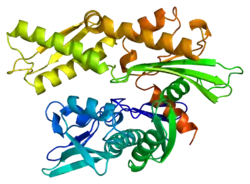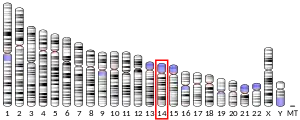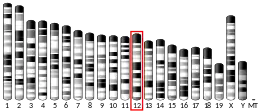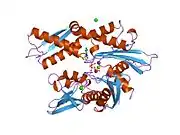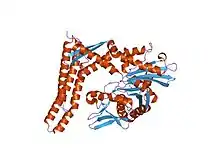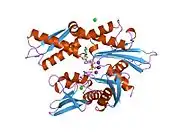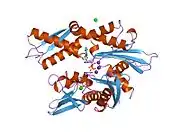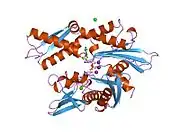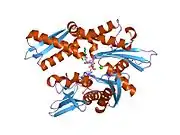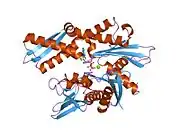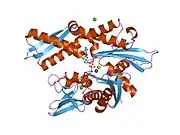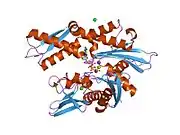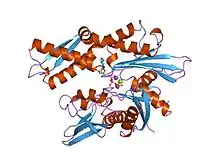HSPA2
Heat shock-related 70 kDa protein 2 is a protein that in humans is encoded by the HSPA2 gene.[5]
References
- GRCh38: Ensembl release 89: ENSG00000126803 - Ensembl, May 2017
- GRCm38: Ensembl release 89: ENSMUSG00000059970 - Ensembl, May 2017
- "Human PubMed Reference:". National Center for Biotechnology Information, U.S. National Library of Medicine.
- "Mouse PubMed Reference:". National Center for Biotechnology Information, U.S. National Library of Medicine.
- "Entrez Gene: HSPA2 heat shock 70kDa protein 2".
Further reading
- Schwab CG, Bozak CK, Whitehouse NL, Olson VM (1993). "Amino acid limitation and flow to the duodenum at four stages of lactation. 2. Extent of lysine limitation". J. Dairy Sci. 75 (12): 3503–18. doi:10.3168/jds.S0022-0302(92)78126-0. PMID 1474216.
- Dworniczak B, Mirault ME (1987). "Structure and expression of a human gene coding for a 71 kd heat shock 'cognate' protein". Nucleic Acids Res. 15 (13): 5181–97. doi:10.1093/nar/15.13.5181. PMC 305955. PMID 3037489.
- Bonnycastle LL, Yu CE, Hunt CR, et al. (1995). "Cloning, sequencing, and mapping of the human chromosome 14 heat shock protein gene (HSPA2)". Genomics. 23 (1): 85–93. doi:10.1006/geno.1994.1462. PMID 7829106.
- Roux AF, Nguyen VT, Squire JA, Cox DW (1995). "A heat shock gene at 14q22: mapping and expression". Hum. Mol. Genet. 3 (10): 1819–22. doi:10.1093/hmg/3.10.1819. PMID 7849706.
- Furlini G, Vignoli M, Re MC, et al. (1994). "Human immunodeficiency virus type 1 interaction with the membrane of CD4+ cells induces the synthesis and nuclear translocation of 70K heat shock protein". J. Gen. Virol. 75 (1): 193–9. doi:10.1099/0022-1317-75-1-193. PMID 7906708.
- Allen JW, Dix DJ, Collins BW, et al. (1996). "HSP70-2 is part of the synaptonemal complex in mouse and hamster spermatocytes". Chromosoma. 104 (6): 414–21. doi:10.1007/BF00352265. PMID 8601336. S2CID 7244472.
- Dix DJ, Allen JW, Collins BW, et al. (1996). "Targeted gene disruption of Hsp70-2 results in failed meiosis, germ cell apoptosis, and male infertility". Proc. Natl. Acad. Sci. U.S.A. 93 (8): 3264–8. Bibcode:1996PNAS...93.3264D. doi:10.1073/pnas.93.8.3264. PMC 39594. PMID 8622925.
- Zhu D, Dix DJ, Eddy EM (1997). "HSP70-2 is required for CDC2 kinase activity in meiosis I of mouse spermatocytes". Development. 124 (15): 3007–14. doi:10.1242/dev.124.15.3007. PMID 9247342.
- O'Keeffe B, Fong Y, Chen D, et al. (2000). "Requirement for a kinase-specific chaperone pathway in the production of a Cdk9/cyclin T1 heterodimer responsible for P-TEFb-mediated tat stimulation of HIV-1 transcription". J. Biol. Chem. 275 (1): 279–87. doi:10.1074/jbc.275.1.279. PMID 10617616.
- Agostini I, Popov S, Li J, et al. (2000). "Heat-shock protein 70 can replace viral protein R of HIV-1 during nuclear import of the viral preintegration complex". Exp. Cell Res. 259 (2): 398–403. doi:10.1006/excr.2000.4992. PMID 10964507.
- Andersen JS, Lyon CE, Fox AH, et al. (2002). "Directed proteomic analysis of the human nucleolus". Curr. Biol. 12 (1): 1–11. doi:10.1016/S0960-9822(01)00650-9. PMID 11790298.
- Gurer C, Cimarelli A, Luban J (2002). "Specific incorporation of heat shock protein 70 family members into primate lentiviral virions". J. Virol. 76 (9): 4666–70. doi:10.1128/JVI.76.9.4666-4670.2002. PMC 155079. PMID 11932435.
- Strausberg RL, Feingold EA, Grouse LH, et al. (2003). "Generation and initial analysis of more than 15,000 full-length human and mouse cDNA sequences". Proc. Natl. Acad. Sci. U.S.A. 99 (26): 16899–903. Bibcode:2002PNAS...9916899M. doi:10.1073/pnas.242603899. PMC 139241. PMID 12477932.
- Shin BK, Wang H, Yim AM, et al. (2003). "Global profiling of the cell surface proteome of cancer cells uncovers an abundance of proteins with chaperone function". J. Biol. Chem. 278 (9): 7607–16. doi:10.1074/jbc.M210455200. PMID 12493773.
- Lim MC, Brooke SM, Sapolsky RM (2003). "gp120 neurotoxicity fails to induce heat shock defenses, while the over expression of hsp70 protects against gp120". Brain Res. Bull. 61 (2): 183–8. doi:10.1016/S0361-9230(03)00113-8. PMID 12832005. S2CID 35451084.
- Ota T, Suzuki Y, Nishikawa T, et al. (2004). "Complete sequencing and characterization of 21,243 full-length human cDNAs". Nat. Genet. 36 (1): 40–5. doi:10.1038/ng1285. PMID 14702039.
- Bouwmeester T, Bauch A, Ruffner H, et al. (2004). "A physical and functional map of the human TNF-alpha/NF-kappa B signal transduction pathway". Nat. Cell Biol. 6 (2): 97–105. doi:10.1038/ncb1086. PMID 14743216. S2CID 11683986.
- Brandenberger R, Wei H, Zhang S, et al. (2005). "Transcriptome characterization elucidates signaling networks that control human ES cell growth and differentiation". Nat. Biotechnol. 22 (6): 707–16. doi:10.1038/nbt971. PMID 15146197. S2CID 27764390.
- Gerhard DS, Wagner L, Feingold EA, et al. (2004). "The status, quality, and expansion of the NIH full-length cDNA project: the Mammalian Gene Collection (MGC)". Genome Res. 14 (10B): 2121–7. doi:10.1101/gr.2596504. PMC 528928. PMID 15489334.
- Rual JF, Venkatesan K, Hao T, et al. (2005). "Towards a proteome-scale map of the human protein-protein interaction network". Nature. 437 (7062): 1173–8. Bibcode:2005Natur.437.1173R. doi:10.1038/nature04209. PMID 16189514. S2CID 4427026.
External links
- HSPA2+protein,+human at the U.S. National Library of Medicine Medical Subject Headings (MeSH)
This article is issued from Wikipedia. The text is licensed under Creative Commons - Attribution - Sharealike. Additional terms may apply for the media files.
